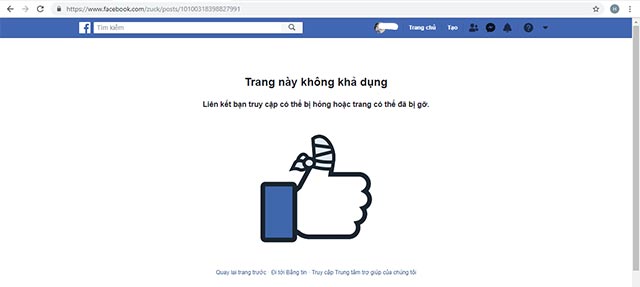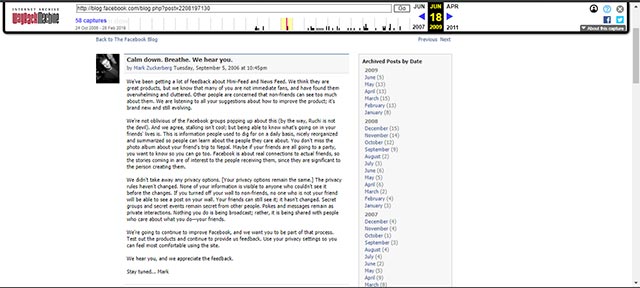Many of Mark Zuckerberg's old posts disappeared 'leaving no trace', Facebook said they had ... mistakenly deleted
Recently, on many forums of eight technology stories, it has been revealed that all of Mark Mark Zuckerberg's old Facebook posts have disappeared, and the company's team said they had . erased mistakes? ! However, experts do not think that things are as simple as that. Many opinions suggest that this move stems from the fact that Facebook is trying to conceal some important information and policies (possibly even wrong policies) that the head of Mark Zuckerberg made many years ago. before.
Specifically, the news website Business Insider discovered that many public posts a few years ago by the 34-year-old CEO completely disappeared from the world's largest social networking site. It is known that most of them are articles sharing policies and activities of Facebook in the period from 2007 to 2008. And to answer questions from observers, a spokesman Facebook said the posts of the CEO were "mistakenly deleted" due to "technical errors".

New settings help hackers test security for Facebook and Instagram applications more easily
'There were some old CEO Mark Zuckerberg's old posts that were mistakenly deleted due to technical errors. The work needed to restore these posts was taken into account, but it was not guaranteed to be 100% successful, and at the same time these posts were too 'old' so we decided not to do it. there. Of course we fully agree that everyone has access to information about announcements and big news that the company has posted before, which is why for years Facebook has advanced. share and store this form data publicly, first on the blog, then on our Newsroom application, 'said a Facebook spokesman in a statement.
These questionable 'missing' posts, along with many other important changes that Facebook has made in its recently released repository management and blog post policies making it difficult to analyze the 'profile' of this social site for experts. At the same time, this also makes it much more complicated to hold information about the company's operating policy, and it is Zuckerberg's CEO who will be held accountable for past claims - dense especially during the close inspection and supervision phase of the authorities with Facebook and the internal company itself after a series of serious scandals over the past time.

- Tonight (March 26), Facebook's "dating" feature will be available in Vietnam, are you ready to try it out?
Basically, the nature of this problem lies in when the important policy and operational postings of many years ago have been deleted, it will be extremely difficult for authorities or analysts to have Can make complete and accurate statistics on what this social networking site has actually implemented and implemented over the past few years. Besides, Facebook did not specify how many posts were 'mistakenly deleted'.
The case is curious about Mark Zuckerberg's Facebook posts
Remember in April 2012, Facebook bought Instagram - the most important moment in the development of this California tech giant. And with the recent 'mistaken' incident, many of the time-based news reports cited from CEO Mark Zuckerberg's public posts on the personal Facebook page of the cult deal are now inaccessible. half.
Links to that post from many older articles are no longer accessible because the CEO's original post has been removed.

- Facebook admits storing millions of user passwords in plain text
This is a good example of an important document in aggregating deleted Facebook activity profiles. Specifically, after this deal, Mark Zuckerberg promised that "we are committed to building Instagram independently" - a commitment that can be seen to date that the 34-year-old CEO has gone against. all. In fact, Facebook is incorporating the Instagram photo sharing app into its social networking platform more closely, and the tensions surrounding this issue have contributed to the departure of two bright 2 set up Instagram in September 2018 (a copy of Mark Zuckerbrerg's post about the incident was also stored on Facebook's Newsroom blog).
However, things don't stop there. Observers have discovered that Facebook CEO posts have been deleted 'thoroughly' by the year. For example, during both 2006 and 2009, Zuckerberg regularly operated on this social network, but currently, no longer his posts in 2007 and 2008 can be found anymore, they have been Clean 'clean'.
Another concrete example helps us better understand this problem: The most beloved chef at Facebook Josef Desimone was killed in a motorcycle accident in July 2013. TechCrunch later reported at the time Zuckerberg shared this news in a Facebook post. However, that article is now no longer accessible. While many other articles seem to be 'less important' by Mark Zuckerberg, this time is still public.
Facebook has made it harder to navigate the archives of old messages
In the end, there was a problem about accessing the archive of old posts on Facebook's blog.
In previous years, Facebook has owned a blog dedicated to posting and storing regular posts periodically, and they can navigate by month. However, in 2014, Facebook launched a newsroom called Newsroom - a new archive for important announcements, and at the same time the appearance of this application also broke public links. to many old blog posts.
Now, when you click on a link to a blog post listed in an old news piece, it will redirect you to Newsroom. However, Newsroom does not store copies of many of these old blog posts, so there is no way you can easily access them as before.

- Facebook Messenger adds a citation response feature, adding a step forward in integrating messaging services
In fact, these posts still exist as "notes" saved to Facebook's public "Facebook" page on this social networking platform. But to this day, there is no centralized repository that users can use to browse these posts.
Instead, to read a specific post, you must know the information about that post and search for keywords on Google, or scroll through thousands of Facebook page posts over the years to 'sneak' in the way. handmade as possible.
After the Business Insider news page made a comment, Facebook added a public "notes" tab to the Facebook page to access the old post (Facebook spokesperson said that the notes tab was available from 2014, but yes " "error appears that users cannot view." And at the same time, tabs notes also give very slow download speeds.
Taking a simple example of the launch of the News Feed feature on Facebook in 2006, has now become an 'advertising site' that is generating billions of dollars in revenue for this social networking site. Mark Zuckerberg tried to appease the users' backlash early on that the News Feed contained too much advertising information and affected privacy with a blog post called "Calm down. Breathe. We hear you "(roughly translated: Stay calm, we are still listening to you), however, linking to this post in a TechCrunch news report currently only redirects to the Newsroom homepage, no longer any post! That is, there is absolutely no copy of this post in the Newsroom blog post archive, as Facebook claims, and it is currently only available as a note from this social networking site. Below is a picture of this post stored on the Internet Archive:

- Facebook uses AI to actively filter intentional pornography
As mentioned, the direct impact of this change on the archive of archives is a dramatic disturbance to Facebook's historical record - making the company's search for past statements and announcements This becomes much more difficult.
It is not the first time that the same thing has happened
In fact, this is not the first time that Zuckerberg-related content has disappeared without a warning from Facebook, or rather, no good reason.
In April 2018, TechCrunch reported that messages sent by the CEO were deleted from the inbox of other users without any notice or their consent - especially when the message was removed. Messenger messages are a feature not available for regular Facebook users at the time.
Going back a little time, in November 2016, public posts from CEO Mark Zuckerberg about social networking and Facebook's role in the 2016 presidential election of the United States also went away without words. farewell '. The Verge news site reported on the incident at that time and after a few days, a Facebook spokesperson contacted the site and announced that it was just an 'accident' and a post later. has been restored.
- Facebook is officially under criminal investigation for allegedly illegally selling data
Perhaps Facebook should be more honest in its activities if it wants to regain the trust of users after a series of big scandals in the past few years.